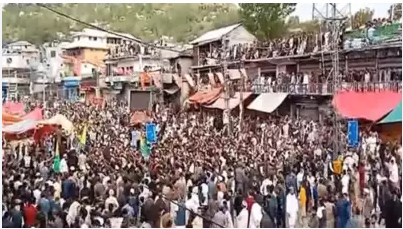At least three people were killed and six others injured when security forces opened fire on protesters during clashes with paramilitary Rangers in Pakistan-occupied Jammu and Kashmir’s capital Muzaffarabad which has been rocked by protests against high prices of wheat flour and inflated electricity bills, a media report said on Tuesday.
The paramilitary Rangers, which were called in to maintain law and order in the disputed region, came under attack while moving out of the region, the Dawn newspaper reported.
Instead of exiting via Brarkot, the village bordering Khyber Pakhtunkhwa, the 19-vehicle convoy, including five trucks, chose to exit the region from Kohala, it said.
As the convoy reached Muzaffarabad in a “charged atmosphere”, it was pelted with rocks near Shorran da Nakka village, to which they responded with teargas and firing, the report said.
After entering the city through the Western Bypass, the Rangers were welcomed with rocks again, prompting them to use teargas and bullets. The shelling was so intense that the entire neighbourhood reeled from it, the report said. Prime Minister Shehbaz Sharif had yesterday approved a Pakistani Rs 23 billion subsidy for immediate release to the region after the negotiations between the protesters and the regional government ended in a deadlock. However, the government’s decision to dole out the subsidy failed to pacify the region, the report said. The disputed region also witnessed clashes on Saturday between the police and activists of a rights movement, leaving at least one police officer dead and injuring over 100 people, mostly policemen. A complete strike has also been observed in the territory since Friday, bringing life to a halt.
Shortly before the violence, Prime Minister Sharif and the disputed region’s ‘prime minister’ Anwarul Haq after a meeting had approved the release of Pakistani Rs 23 billion for the region on account of power and wheat subsidies.
The subsidised rate for 40kg flour will be Pakistani Rs 2,000, down from Pakistani Rs 3,100. The electricity tariff was reduced to Pakistani Rs 3, Rs 5 and Rs 6 per unit for up to 100, 300, and more than 300 units, respectively, the Dawn reported. The protest is led by the Jammu Kashmir Joint Awami Action Committee (JAAC), which has traders at the forefront in most parts of the region, who have been seeking the provision of electricity as per hydropower generation cost in the region, subsidised wheat flour and an end to the privileges of the elite class.
A long march led by the JAAC left for Muzaffarabad, the capital of PoK, on Monday as the wheel-jam strike entered its fourth day. The movement announced its march on Muzaffarabad after the talks between the JAAC core committee and Chief Secretary of the region Dawood Bareach ended in a stalemate.
Expressing deep concern over the violent clashes between the police and the protesters, Prime Minister Sharif on Sunday said that there should be “absolutely no tolerance for taking the law into one’s own hands”.
”I urge all parties to resort to a peaceful course of action for resolution of their demands. Despite the best efforts of detractors, the matter will hopefully be settled soon,” he said.
As part of his efforts to calm down tensions, President Asif Ali Zardari urged all the stakeholders to exercise restraint and resolve the issues through dialogue and mutual consultation


